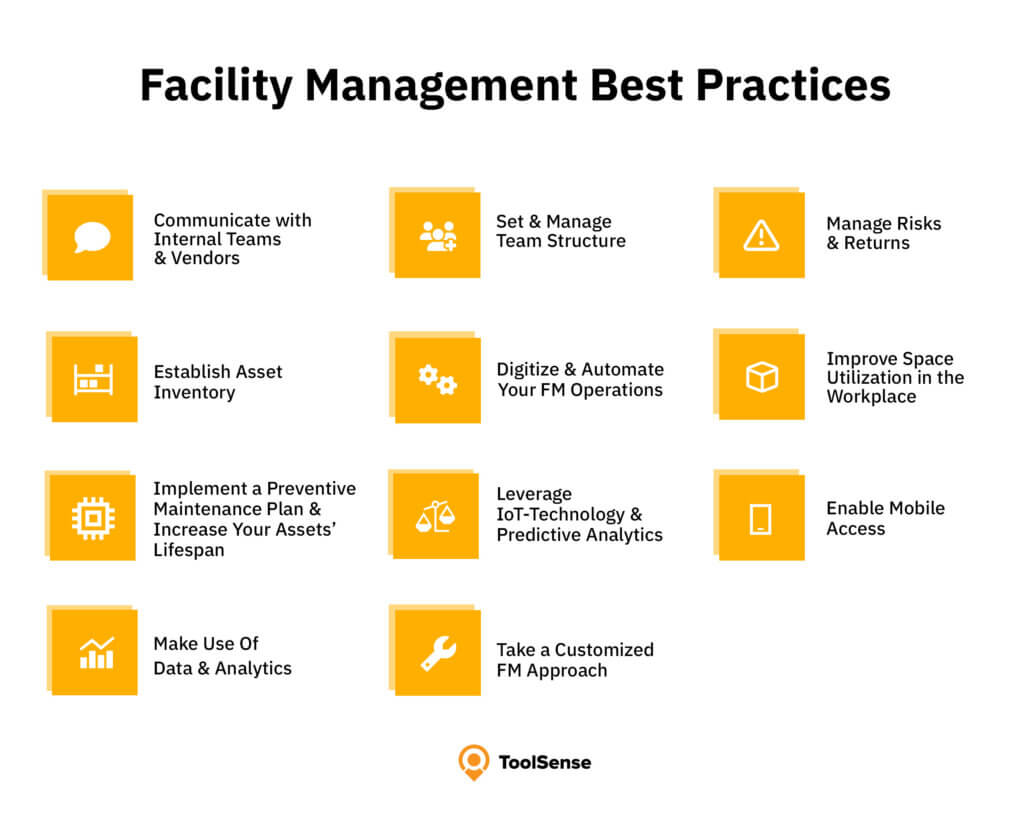The Role of Facility Management in Sustainable Operations
The Role of Facility Management in Sustainable Operations
Blog Article
Key Patterns Forming the Future of Center Management in 2024
As we look ahead to 2024, the landscape of center administration is poised for significant makeover, driven by numerous essential trends. The assimilation of wise building modern technologies and a change towards data-driven decision-making assurance to boost operational performance while focusing on sustainability in practice.
Smart Structure Technologies

Smart structure modern technologies encompass a broad selection of systems, including intelligent lighting, a/c controls, and protection systems. By incorporating these systems, facility managers can monitor and adjust parameters in real-time, resulting in considerable reductions in energy waste and operational costs. As an example, smart sensors can detect occupancy levels and readjust lights and temperature level as necessary, making sure that power is only utilized when required.
Additionally, these innovations help with enhanced information collection, enabling organizations to track use patterns and recognize chances for further improvements. The execution of wise building modern technologies not just adds to sustainability goals yet likewise creates much healthier work environments that can enhance worker productivity and satisfaction.
As we relocate into 2024, the fostering of wise building modern technologies will likely speed up, mirroring a wider shift in the direction of more smart, responsive, and lasting facility administration practices.
Data-Driven Choice Making
Progressively, organizations are leveraging data-driven decision making to boost center monitoring practices. By using data analytics, center supervisors can derive workable insights that substantially improve operational performance and resource allowance. The integration of sophisticated technologies, such as IoT sensors and real-time surveillance systems, enables the collection of huge quantities of data on building efficiency, occupancy rates, and power intake.
This wealth of info permits facility managers to determine fads, predict maintenance requirements, and proactively address concerns before they escalate. For circumstances, anticipating analytics can anticipate equipment failings, decreasing downtime and fixing expenses. Additionally, data visualization tools assist in far better interaction amongst stakeholders, ensuring that informed decisions are made collaboratively.
Additionally, data-driven methods improve calculated preparation by allowing center supervisors to examine the performance of existing techniques and make educated choices regarding investments in technology or infrastructure. As organizations increasingly focus on functional quality, data-driven choice making is poised to become a cornerstone of successful center monitoring approaches in 2024 and past. Eventually, the capability to leverage data effectively will encourage companies to produce extra efficient, productive, and resistant facilities.
Sustainability and Environment-friendly Practices
The focus on data-driven decision making naturally straightens with the expanding focus on sustainability and green practices within center administration. As organizations increasingly focus on environmental responsibility, center supervisors are leveraging analytics to optimize source usage, reduce waste, and decrease carbon impacts. This tactical approach makes it possible for the combination of energy-efficient systems, such as LED lighting, clever a/c controls, and renewable resource sources right into facility procedures.
Additionally, the implementation of lasting methods expands past power consumption. Center managers are taking on environment-friendly materials and advertising reusing efforts to develop a circular economic situation within their facilities. This not just enhances the environmental account of the organization however additionally promotes a society of sustainability among workers.
Conformity with environmental guidelines is another vital facet driving the adoption of eco-friendly techniques. By using information analytics, center managers can keep an eye on conformity metrics and identify areas for enhancement, ensuring adherence to local and worldwide sustainability standards.
Hybrid Job Versions
A significant shift towards hybrid job versions is improving the landscape of facility administration in 2024. This paradigm integrates in-office and remote job, necessitating a reevaluation of space usage, source appropriation, and staff member engagement techniques. Organizations are progressively identifying the relevance of adaptable workspaces that cater to diverse needs and preferences.
Center managers need to adapt by carrying out versatile office layouts that support joint efforts while supplying locations for focused job. This consists of the combination of technology to assist in smooth communication and partnership amongst remote and in-office staff members. Smart structure options, equipped with sensing units and analytics, allow for real-time tracking of room use, enabling organizations to maximize their environments efficiently.
Furthermore, crossbreed job designs highlight the requirement for efficient facility management that prioritizes staff member experience. In significance, the crossbreed job design is transforming facility management, urging an aggressive technique to satisfy the developing demands of the labor force.
Boosted Passenger Wellness
As organizations welcome hybrid job designs, a heightened concentrate on passenger wellness is becoming indispensable to center management strategies. Facility Management. This change acknowledges that a healthy and completely satisfied labor force directly influences performance and retention rates. Center managers are currently prioritizing settings that promote mental and physical well-being, incorporating elements such as all-natural lighting, biophilic layout, and easily accessible wellness resources

Technology plays an essential role in this development. Smart building systems can keep track of environmental elements and adjust setups in real-time, making certain optimum convenience degrees - Facility Management. Comments mechanisms, such as occupancy sensing units and worker surveys, permit center managers to continually improve wellness efforts based on resident demands.

Verdict
In 2024, the future of center administration will be substantially influenced by the combination of smart building technologies and data-driven decision-making, cultivating boosted functional effectiveness. These patterns collectively underscore the evolving landscape of center monitoring in action to contemporary difficulties and opportunities.
Facility supervisors are embracing environment-friendly materials and promoting best site reusing campaigns to produce a circular economic situation within their centers.A significant change towards crossbreed work designs is reshaping the landscape of facility monitoring in 2024.Moreover, hybrid job versions stress the requirement for efficient facility monitoring that prioritizes employee experience.As companies accept hybrid work models, an enhanced emphasis on passenger health is ending up being integral to facility management strategies.In 2024, the future of center administration will certainly be dramatically affected by the assimilation of wise structure technologies and data-driven decision-making, promoting improved functional performance.
Report this page